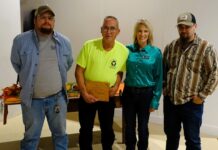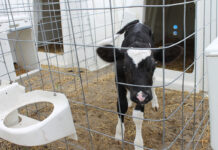MOUNDSVILLE, W.Va. – When the Glen Dale, W.Va., Marx toy plant closed its doors, it left its workers unemployed, its walls empty, its machines idle, and its kids abandoned. It was the loss of a great toy company, a loss of employees’ dreams, and a loss of children’s wish lists.
But one Marx toy collector, Francis Turner, has rekindled those dreams and memories, with the opening of the Official Marx Toy Museum in Moundsville, W.Va.
Spurred by others. Turner’s dream started in 1992 when he witnessed the enthusiasm of visitors and ex-employees admiring his collection of Marx toys at the Stifel Art Gallery in Wheeling, W. Va.
Turner, who started collecting Marx toys in 1982 and more passionately since 1989, listened to the visitors’ comments and started thinking about a permanent house and display for his growing collection. If these people were interested in the Marx toys, maybe there were others.
In the early 1990s, Turner’s Marx interest kicked into high gear, selling duplicate toys, attending national toy shows and sales and becoming expert in the field of Marx toys and prices. He became a regular contributor to “Plastic Figure and Playset Collector” magazine.
Because he lived so close to the old Glen Dale plant, he met former employees and listened to their work stories, gaining greater insight into the company.
Today, he has more than 300 Marx playsets, many of them mint in the box, including the rarer Giant Blue and Gray civil war playset, Robin Hood, Ben Hur and The Untouchables. He is considered one of the top five collectors of Marx toys in the country.
The museum, located in Moundsville at 915 Second Street, just 1 mile from the former Marx Toy Factory in Glen Dale, is dedicated to toys created by the Marx company from the 1930s through the late 1970s.
In its heyday, the Louis Marx & Co. had factories in Erie and Girard, Pa., and in Glen Dale and Wheeling, West Virginia. It also had interests in Massachusetts, Mexico, London, South Africa, Australia, Canada, Brazil and
Company support. In researching his museum project, Turner talked with Jay Horwitz, president of Marx Toy Corporation, several times. Marx Toys Inc. granted Turner a license to use the Marx name, trademark, and logo type for his museum in accordance with agreeable terms.
The Marx Toy Museum will incorporate original films about the Louis Marx history, the Glen Dale plant operations, and 1960s television commercials.
Marx history. Louis Marx was born Aug. 11, 1896, in Brooklyn, N. Y. Early in life he worked for Ferdinand Strauss Company, which made wind-up tin toys. With a few short years, Louis Marx was plant manager of the New Jersey facility, but his ideas on how to increase toy production and cut costs differed with the managers at Ferdinand Straus and they fired him.
Marx then spent two years in the service and when he got out, he started working for a wooden toy company and helped boost sales from 1,500 to 1.5 million toys. Again, Marx thought they could do better, and make more toys at a lower cost, but his ideas again cost him his job.
On his own. So in 1919, Louis Marx and his brother, David, started Louis Marx & Company. One of the first things they did was go back to Ferdinand Strauss, which was now out of business, and buy two of their molds, a dancing figure and the monkey on the string.
At the time, Louis Marx & Co. didn’t even have its own facilities; it paid other companies to make their toys. Louis Marx changed the colors of the toys, found ways to cut costs and lower prices, and the first year, Marx sold 8 million of each of the two tin toys produced.
It wasn’t until 1933-34 that Louis Marx & Co. acquired its first three facilities in the United States. One plant in Erie, Pa., produced the MT, mechanical toys, like the wind-ups and things. A second plant in Girard, Pa., made the Marx trains and other toys that required heavier metal work like the roller skates and gun mechanisms.
The Glen Dale plant. Their largest facility was in Glen Dale, W.Va., which made the PT, push toys, and the KD or knock-down toys, like the Marx playsets. These were produced in a variety of departments, but “knocked down” in the smaller playset boxes on an assembly line.
About 90 percent of the plastic toys in the museum were made in the Glen Dale factory. It was Marx’s largest facility and employed more than 2,000 employees during most of their years.
In 1946, the Glen Dale factory was dipping, painting, and baking 3.5 million pieces per month.
During the ’50’s and ’60s, the Marx playset pieces were being produced in various departments in the plant and would finally be assembled in a playset box on an assembly line. The Marx assembly line could assemble 3,000 sets per day and they would normally run that line for a week to get about 20,000 sets of that playset before going on to assemble the next set.
When Marx started producing the Johnny West Series figures, the Glen Dale facility could assemble 3,000 figures per day.
When the Marx started making the Big Wheel, Marx could make 3,100 Big Wheels per eight-hour shift, or 9,300 Big Wheels per day.
In 1972, Marx Company sold out to the Quaker Oats Company. Four years later, Quaker Oats sold the company to Dunbee Combex for $18 million. In 1980, Dunbee-Combex-Marx declared bankruptcy.
Federal judges gave the facilities two years to find someone to come in and start producing toys before having to liquidate the factories. The deadline fell on May 5, 1982, but no one showed any interest in the facilities. Ironically, Louis Marx died May 5, 1982.
Unique museum. The museum is housed in a former grocery store and has more than 4,000 square feet. The interior design features a 1950s theme.
The collection for display includes mint in-box toys, Marx playsets, metal toys, loose figures, one-of-a-kind prototypes, and several store displays.
Marx made three basic types of toys: Toys relating to TV such as the Flintstones, Ben Hur, Zorro, Gunsmoke, Wagon Train, etc. Toys from history like the Civil War, Revolutionary War, Iwo Jima, and other historical sets. And, finally, toys relating to thing children would see in real life, such as lawn mowers, dump trucks, car haulers, farm sets, dollhouses, service stations and airports.
* * *
The Official Marx Toy Museum is located at 915 Second St., Moundsville, West Va. The building is handicapped accessible. It is open April through December on Thursday from 11 a.m. until 5 p.m.; Friday, 11 a.m. until 8 p.m.; and weekends from 11 a.m. until 5 p.m. Call for holiday, evening or seasonal hours. Group tours can also be scheduled.
Admission is $6.50 for adults; $6 for senior citizens; $4.25 for students (6-18); and children under 6 are admitted free with an adult. Call for group rates.
For information, call 304-845-6022; e-mail museum@marxtoymuseum.com; or check out its Web site, http://www.marxtoymuseum.com.









